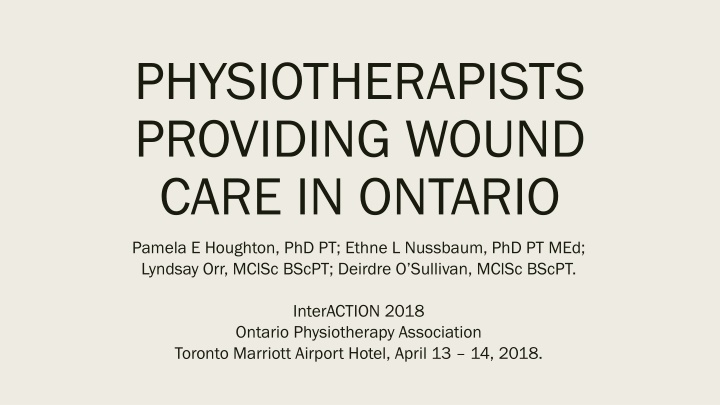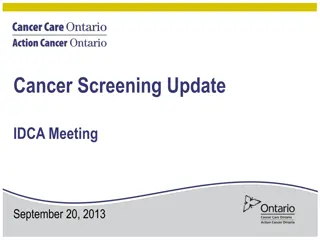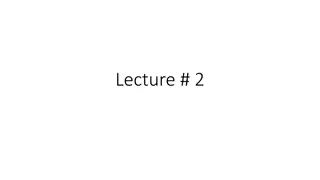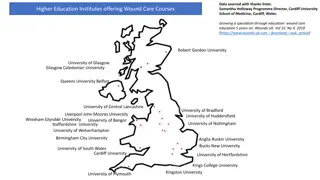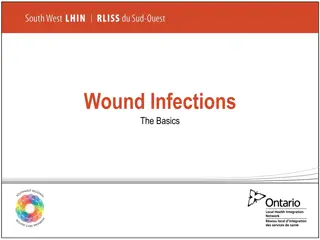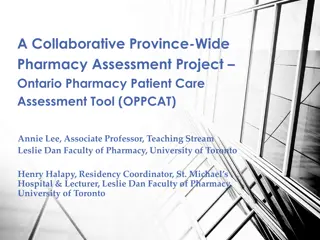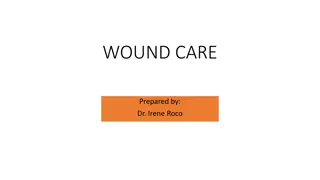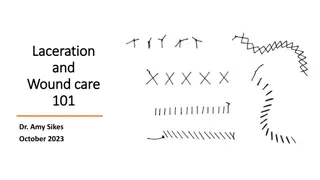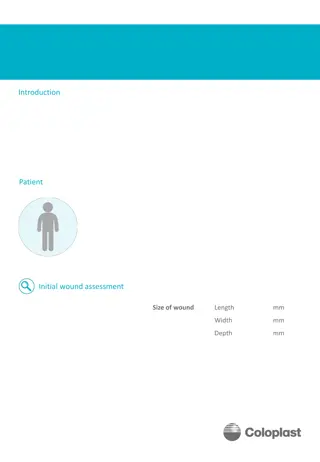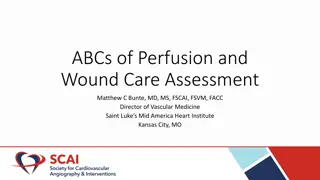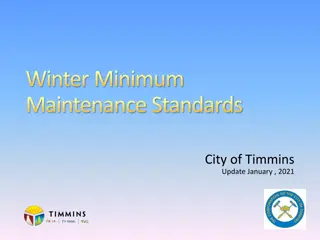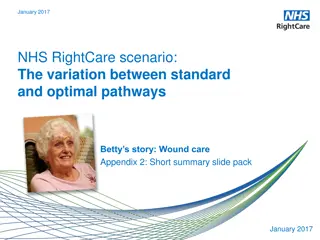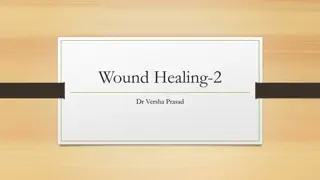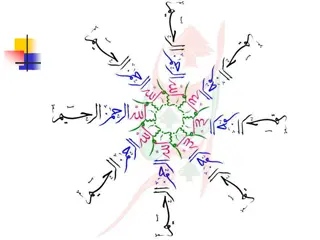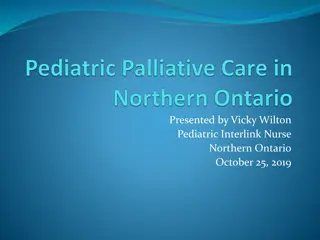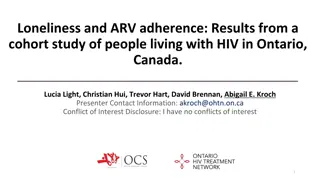Physiotherapists Providing Wound Care in Ontario
Learn about the requirements for independent practice, controlled acts, resources for effective wound care, and maximizing opportunities as a physiotherapist in wound care within Ontario. Explore the necessary training, skills, and competencies needed to excel in this specialized field.
Download Presentation

Please find below an Image/Link to download the presentation.
The content on the website is provided AS IS for your information and personal use only. It may not be sold, licensed, or shared on other websites without obtaining consent from the author.If you encounter any issues during the download, it is possible that the publisher has removed the file from their server.
You are allowed to download the files provided on this website for personal or commercial use, subject to the condition that they are used lawfully. All files are the property of their respective owners.
The content on the website is provided AS IS for your information and personal use only. It may not be sold, licensed, or shared on other websites without obtaining consent from the author.
E N D
Presentation Transcript
PHYSIOTHERAPISTS PROVIDING WOUND CARE IN ONTARIO Pamela E Houghton, PhD PT; Ethne L Nussbaum, PhD PT MEd; Lyndsay Orr, MClSc BScPT; Deirdre O Sullivan, MClSc BScPT. InterACTION 2018 Ontario Physiotherapy Association Toronto Marriott Airport Hotel, April 13 14, 2018.
Session Objectives After attending the session participants will: Know what is required in order to roster as an independent practitioner providing wound care with the College of Physiotherapy of Ontario; Be able to identify their learning needs for providing effective wound care; Know what resources are available for learning and/or improving their knowledge and skills in the field of wound care
Controlled Acts for Purpose of Wound Care cleansing soaking irrigating probing debriding packing dressing W O U N D C A R E P R I N C I P L E S
College Standard for Controlled Acts Physiotherapists must be able to prove that they have successfully completed training for the controlled acts they perform. This can be formal education or training delivered on the job. During the training, the physiotherapist must: Learn the indications, contraindications, adverse outcomes, and risks associated with performing the controlled act. Practice the controlled act under the supervision of a person who is authorized to perform it. Be evaluated on the knowledge, judgement, and practical skills needed to perform the controlled act. Show that they are able to safely and competently perform the controlled act http://www.collegept.org/Standards/Controlled_Acts W O U N D C A R E P R I N C I P L E S
Maximising opportunity as a PT in Wound Care Within Ontario wound care can be performed to the full scope of your abilities under the mechanism of a medical directive or delegation independently if you are a rostered practitioner Remaining on the College roster for wound care You must have performed and/or received training in the authorized activity in the last 2 years. Opportunities for acquiring the education for independent practice MClSC Western University Wound Care Management OPA Courses International Interprofessional Wound Care Course (IIWCC) On the job training, e.g. hospital training
Wound Care for Physical Therapists. Level 1 basic knowledge Level 1 is an on-line course. : Content covers the basic knowledge underpinning best practices in wound care When registrants elect to demonstrate their learning in the Level 1 course, they may take the on-line test and must obtain a minimum of 70% on the test to qualify to take the Level 2 course Upon completion of Level 1 & 2 and providing they meet the requirement of clinical experience, it is expected that participants will be in a position to roster with the CPO to perform the authorized activity of treating a wound below the dermis
Wound Care for Physical Therapists Level 2 Clinical Skills 1. Uses cases and clinical scenarios to enhance prior knowledge. 2. Discusses best practice guidelines including wound bed preparation paradigm to develop a comprehensive wound care plan. 3. Discusses valid and reliable wound assessment tools to describe wound status, including infection and deterioration, and to evaluate whether wound treatments are effective. 4. Discusses different categories of wound dressings and their role in managing the local wound environment. Includes opportunity to handle and manipulate many different types of dressings. 5. Includes practice and a test of clinical skills - irrigating, probing, packing and dressing wounds using universal precautions and good aseptic technique.
Wound Care for Physical Therapists Level 3 Level 3 courses are open to PTs who have successfully completed Levels 1 and 2 or PTs who already perform controlled acts under medical directive or delegation. Level 3A workshop includes: Performing & interpreting vascular tests of the lower limb including Ankle Brachial Pressure Index (ABI) Selecting/applying compression systems to manage chronic leg edema Identifying appropriate clients and applying removable and non-removable foot offloading devices Prescribing exercise programs that will optimize mobility and address underlying causes of skin breakdown Level 3B workshop on advanced therapies includes: Electrical stimulation, ultrasound, laser and ultraviolet therapy Biophysical interactions, clinical effectiveness, supporting research and equipment Demonstration of techniques and practice by participants Level 4 course teaches wound debridement.
INTERNATIONAL INTERPROFESSIONAL WOUND CARE COURSE (IIWCC) A certificate course accredited by the University of Toronto s Continuing Education & Professional Development office Two mandatory residential weekends (4 days each) Fourteen self-study modules - nine required to complete 4 Student Chosen (S) nine required to complete: 5 Faculty Chosen (F), A selective related to course content interpreted/ presented to class members and a written report that is translated to each student's day-to-day activities
Masters of Science in Community Health: Wound Prevention and Care. Dalla Lana School of Public Health / The University of Toronto Program Director, Dr. Gary Sibbald 12 months full-time; up to 6 years part-time Introduction to Public Health Sciences 0.5 Public Health Policy 0.5 Wound Prevention & Care 1.0 Teaching & Learning in the Health Professions (A): Principles and Theories 0.5 Teaching & Learning in the Health Professions (B): Practical Issues and Approaches 0.5 Required Practicum MScCH 0.5
Masters of Clinical Science Masters of Clinical Science in Wound Healing ( in Wound Healing (MClSc MClSc- -WH) WH) One year, 7 courses; Starting each September Distance Education (onsite (5 wks) + online) Clinical Speciality + Research Experience Inter-professional (PT, MD, RN, OT, Chir, etc.) Students & Instructors from across Canada www.westernu.ca/fhs/pt email: phoughto@uwo.ca or charding@uwo.ca FOR MORE INFORMATION: Website
